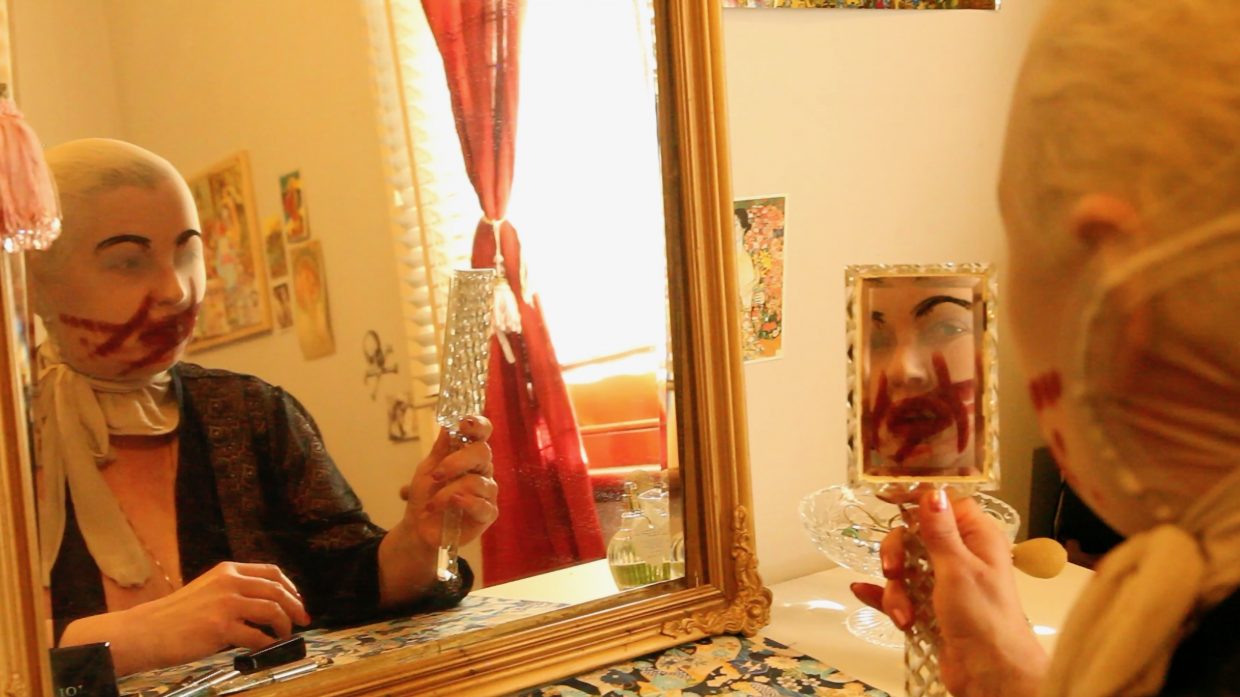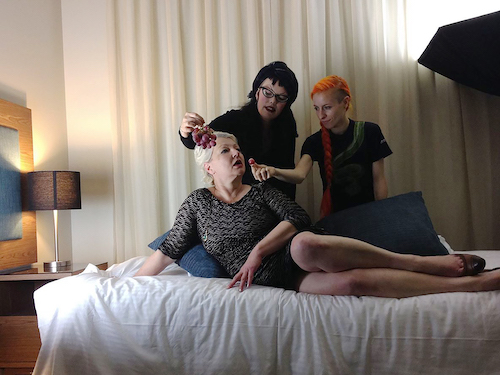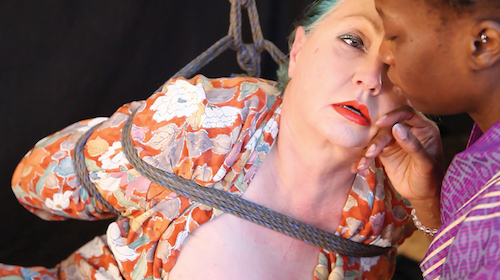 Back to selection
Back to selection
“There is No Expiration Date on Your Sexuality”: Josie Hess and Isabel Peppard on Their Fantasia Festival-Debuting Doc Morgana
 Morgana
Morgana The bored and lonely housewife embarking on a life of erotic pleasure has been a porn-movie trope since at least the days of the 8mm-stag film. But the Belle de Jour-style protagonist is never an unhappy Australian mom who goes from planning suicide, to radically reclaiming agency by hiring a male escort, to soaring to international fame as an award-winning feminist pornographer. Until now. Meet Morgana Muses, the unlikely star of Josie Hess and Isabel Peppard’s Fantasia Film Festival-premiering documentary Morgana.
Hess, a filmmaker and pornographer, and her co-director Peppard, who is also an animator and visual artist, began collaborating on what eventually became an unusual, feature-length character study in a likewise unconventional way — at Morgana’s 50th birthday party. As a gift to herself, the self-invented sex symbol had asked the duo to document the celebration — specifically her naked body suspended in Japanese rope bondage. And thus the idea of a film about an artistically defiant, middle-aged porn star was born.
Prior to the doc’s August 20th virtual fest debut, Filmmaker caught up with the Australian directors to learn all about following the Pornfilmfestival Berlin darling — whose fans include everyone from Petra Joy to Stoya, just two of the many erotic pioneers appearing onscreen to sing Morgana’s praises — on her journey from rural Victoria to urban Germany and back. And from the depths of misery to ageless body positivity.

Filmmaker: It struck me that your team’s alternative “street cred” — i.e., you all come from the punk and/or erotica scenes — was crucial to the making of this film. I’m just doubtful that Morgana, while a physical exhibitionist, would have laid herself so emotionally bare to “vanilla” filmmakers. So did this commonality allow you to push Morgana beyond her well-cultivated persona, or did she just instinctively let down her guard at her own pace?
Peppard: When Morgana initially agreed to let us tell her story, I think that it did help that we were people who were looking at kink and porn from an inside perspective. That said, I think ultimately it was just our human connection and relationship that allowed us to have the access that we did.
Filmmaker: When Morgana runs into financial trouble after moving to Berlin you’re there to capture it, having basically moved to Germany to keep shooting with her. I believe the film was completed through some combination of Kickstarter and government grants. But were you still struggling to raise funds at that point? How did the situation impact production?
Hess: Like lots of indie projects, our budget was cobbled together. We were self-funded all the way through the bulk of the shoot, and we scraped through post-production with Kickstarter and a few small grants from Queer Screen and Screen Australia.
I ended up in Berlin with Morgana because I was working for her, shooting and editing her films. So in 2015, after she had moved to Berlin, I went and shot three films that she produced. I was working for her the entire trip and basically shot the footage for our documentary around my commitments to her. She was very gracious with letting me take up her time on top of her own shoots. It was pretty chaotic for a few weeks.
Filmmaker: Since it’s only been a decade since BDSM, et al. thankfully stopped being classified as a pathology, most kinky folk are loathe to address any aspect bucking the “safe, sane and consensual” line, lest they force an entire community back into the DSM manual. So what concerns did you and Morgana have in approaching some of her struggles, which in a non-kink context wouldn’t necessarily be a third rail?
Hess: I think that like anyone else in the BDSM or kink scene, we find the conflation of mental illness and BDSM most often unhelpful. It’s something we were very conscious of when putting together Morgana’s story. We knew we had to treat it carefully and respectfully, but also that we wanted to show Morgana in her fullness and to not shy away from her complexities since she had expressed a strong desire to show people her life.
As filmmakers, what do you do? Not show the character in her full light just because her narrative isn’t perfect and fits with how we’d like life to be? That would be tantamount to putting the same expectations on her shoulders that she experienced as a wife and mother — but instead for her to be the perfect, sex-positive porn star. We have to show her truth. I hope that in presenting her as she is, we show that there are nuance and grey areas within people. And that is okay.
Peppard: Coming from inside the kink and feminist porn communities ourselves, this is definitely something we talked about a lot! We were very concerned about not demonizing or pathologizing things that were already stigmatized: kink, porn, and female sexuality in general. From a storytelling perspective, our approach was to integrate the sexuality as much as possible with the personal and emotional journey of the character. A big part of that was allowing the audience to really get to know her as a person before some of these more risqué elements came into play so that you really get a sense of how intertwined the sexual experiences are with her humanity and self-discovery.
A lot of the depictions of kink/BDSM in the film are associated with moments of great personal growth or transformation, which culminate in something beautiful or revelatory, as they really did for Morgana in her personal life. She orchestrated these experiences for herself in a way that she describes as spiritual, and that is partly why we handled them that way. We also wanted to make sure that we were never conflating her personal struggles with her sexual preferences, even though they are both things that exist within her as a character.

Filmmaker: While it’s thrilling that Morgana is touching so many lives through the camera, the public attention still sometimes comes at a price to her own well-being. So did you ever worry that by creating this film you were doing more harm than good? Were you compelled to set specific boundaries?
Hess: I check in with Morgana about this a lot. It’s something she went through with her own work and publicly coming out as a pornographer. Raising your head above the parapet as someone who does things differently, no matter how innocuous, will always come with some negatives.
When we realized this film wasn’t going to be a short, that it was going to be a feature, we also discussed the possibilities with Morgana. She very much understands the weight and responsibility behind putting herself out there. Ultimately, we put the choice in her hands, and she continually chose to have her story told. There are definitely boundaries set that protect various elements that we’ve established with her. We just keep the dialogue very open and very honest between us. That way there is always space to speak up if anyone is uncomfortable or needs help.
Peppard: Yes, this is something we thought about a lot. By the time we came on the scene Morgana was screening her work locally, internationally and online, as well as appearing on national television here in Australia, discussing her porn. So she was already well and truly in the public eye. I think we felt more comfortable telling Morgana’s story in the context that she was already public with it and had “outed” herself to the world in a way that she was comfortable with before we came along.
The issues that she deals with later in our film have been lifelong issues for Morgana, that started when she was a young girl. I don’t want to speak for Morgana too much in this area, but the sense I have gotten is that her filmmaking and going public with her story has been a huge redemptive force in her life. She had a very conservative and unhappy upbringing and marriage, where she never fit in or felt like she could be herself. She eventually became invisible and voiceless when she lost her status as a “trophy wife.” She ended up completely isolated in her pain — cut off from any community, creativity, sexuality or sense of self-worth.
After Morgana started making her films and going public, she found an open and loving community that could accept her fully as a human being. She was able to reconnect with her own body and sexuality. And she has been able to find a creative voice that has also inspired others around her.
All this being said, we were definitely very aware of negotiating respectful boundaries with Morgana to protect her and the people that she loved. There were definitely places she didn’t want to go with the story, and people she didn’t want to include, and we always worked around her wishes in this regard. We also gave her approval of the rough cut in case she had any significant issues with the way we had told her story and the material included. She did have a few changes, but nothing major, and I think that is because the process of making the film was an ongoing process of checking in both with her and with each other.
Filmmaker: Do you see the film as a sort of “educational tool” or guide in some way? Are you doing outreach to specific groups?
Hess: We definitely didn’t set out intentionally to make an educational tool — we really just wanted to explore the truth of Morgana as a person. We’ve certainly heard feedback from some that it opens up conversation, which we are thrilled to hear. It’s allowed a lot of people to make the connection that their parents or mothers are people with sexual needs, which is a nice thing to make people aware of. We also get a lot of people grateful for the age-positive message, which is Morgana’s personal key point that she likes to make: “There is no expiration date on your sexuality.”
Peppard: I don’t think we ever saw the film as an educational tool while we were making it. It was always more of a human journey, a hero’s journey if you will. I think that people take from it whatever elements of the story that resonate with them the most on a personal level.
We have actually been pretty surprised by the diversity of people the story has reached. We have had some pretty emotional reactions from men, for example, which was surprising to us since it’s a film with so many issues that seem specific to women. So maybe it has been educational in that way — as perhaps a pulling back of the curtain on female desire and sexuality.
For me, I see the film as the journey of an artist finding her true identity and creative voice. In the film Morgana goes through two cycles of death and rebirth. First, her conservative housewife identity is destroyed and she is reborn as the Phoenix, a beautiful but idealized version of self that is ultimately a new facade. In the second cycle, where she is literally buried (onscreen) and reborn, Morgana emerges as a more realistic and complete version of herself, having had to face issues from her past head-on. Ultimately, she learns to live with her struggles in a realistic way, while still continuing to make films and live as an artist in the world.
